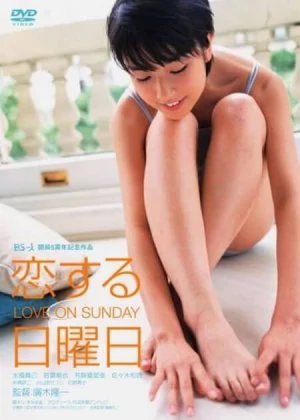Love on Sunday

Ryuichi Hiroki is no doubt one of the best drama directors in Japan, but for some reason his work never truly managed to make a big dent internationally. Love on Sunday [Koi Suru Nichiyobi] is one of those films that passed the West by almost entirely, save a select few people who were able to catch it at a local festival. I was one of those lucky ones, but it's been thirteen years and my memories of the film were vague and somewhat uncertain. Time to jog my memory and give this film a second watch.
![screen capture of Love on Sunday [Koi Suru Nichiyobi]](/thumbs/img/articles/1200xauto/love-sunday-1.webp)
Hiroki made the film together with Manabu Aso, director of the original TV series. I never watched the series and I'm not even sure how this film relates to it, but Love on Sunday is perfectly watchable without having seen the series first. It's also very much a Hiroki film rather than a quick cash-in on some popular TV IP, so you don't have to worry about getting dragged into some cheap TV drama. There is a sequel too (Last Words - also directed by Hiroki), but it is a stand-alone story that is completely separate from this film. As for Aso's role, I'm not entirely sure but Love on Sunday feels 100% Hiroki, so I guess he was mostly there because he worked on the original series.
Love on Sunday is at heart a rather grave and heavy drama about saying your goodbyes, but Hiroki still manages to make it very light and breezy. While the film has enough dramatic punch, it never becomes too sullen or depressive. Instead, the film keeps a positive disposition and its characters push through, even when things aren't looking up for them. It makes for a somewhat dreamy and pleasant watch, a film that does well when you're in the mood for some summery, laid-back drama. In that sense, it resembles the Japanese island dramas.
The story revolves around Akira, a young girl who is moving away to Tokyo. On her last day in the countryside, she meets up with Nao, her childhood friend who she is secretly in love with. Nao doesn't really have eyes for Akira though, instead he fancies Tamaki, the girl that was stood up by Gaku, who left her because has a crush on Akira. The four of them end up together and spend Akira's last day in town together, unaware of the intricate web of emotions that lies behind their little quarrels and outbursts.
![screen capture of Love on Sunday [Koi Suru Nichiyobi]](/thumbs/img/articles/1200xauto/love-sunday-2.webp)
Love on Sunday is a film that happened in the middle of the DV revolution and it shows. The image quality is quite poor, overly grainy and not at all sharp, with the colors being too dull and muted. Even though there's a Blu-ray release of the film, you have to wonder why they even bothered. It's a shame because Hiroki's camera work is on point and the beautiful rural setting adds something valuable to the film. The summery vibes still shimmer through, but not in full capacity.
If you've seen some of Hiroki's films, the soundtrack doesn't hold too many surprises. You'll be getting some Japanese pop, though it's the slightly classier variety, not the overly sugary J-Pop kind. On top of that the film features a pretty jolly and upbeat score, something you might not quite expect from a drama like this one. It's somewhat unusual, but it does work well and it helps to give the film its lightness. I'm sure not everybody is going to appreciate it, but I feel it suited the film well.
The acting is solid, but that's to be expected from a Hiroki film. Even though all the actors are young and have rather challenging parts, they all come off very natural and effortless. It's a trademark Hiroki element that elevates all his dramas, but it remains unique to see how Hiroki pushes his actors beyond their limits. The secondary cast is small (a minor subplot about a teacher and his former girlfriend) but solid too. In the end it's all about the four youngsters though, and they do a tremendous job.
![screen capture of Love on Sunday [Koi Suru Nichiyobi]](/thumbs/img/articles/1200xauto/love-sunday-3.webp)
While most of the screen time is dedicated to the romantic perils, the film is really about saying goodbye to the village you grew up in and the people you grew up with. Again, this could've easily become quite dark and depressing, but Hiroki's characters are pretty receptive to these changes in their lives. That doesn't mean saying goodbye isn't hard for these kids, but if you hope to see a traditional sobby ending you're probably watching the wrong film. Akira's final goodbye is sober and heartfelt, a perfect example of why I like Japanese dramas so much.
While not amongst his best, mostly because of the poor DV quality of the film, this is another quality Hiroki film that easily charmed its way into my list of favourites. Love on Sunday is an endearing film with a warm, summery vibe, strong performances and effective drama without any false sentiment. It's not as edgy as Hiroki's more famous films, but it's a beautiful drama that has a lot going for it and left me feeling warm and content. Maybe not the best Hiroki to start with, but fans of the director can do little wrong with this one.